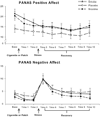Effect of social stress during acute nicotine abstinence
- PMID: 21234550
- PMCID: PMC3094594
- DOI: 10.1007/s00213-010-2150-y
Effect of social stress during acute nicotine abstinence
Abstract
Rationale: Relapse to smoking is often precipitated by stress, yet little is known about the effects of nicotine withdrawal on responses to acute stress, or whether nicotine replacement reverses withdrawal-induced changes in stress response.
Objectives: The aim of the present study is to use an effective social stressor, the Trier Social Stress Test (TSST), to study subjective, cardiovascular and hormonal responses to stress during withdrawal, and examine whether nicotine replacement moderates responses to stress during withdrawal.
Methods: Forty-nine current regular smokers were randomly assigned to smoke as normal (SM), 12-h abstention with placebo patch (PL), or 12-h abstention with nicotine patch (NIC). They participated in a single session using the TSST, during which subjective affect, heart rate (HR), mean arterial blood pressure (MAP) and salivary cortisol were measured.
Results: The TSST produced expected increases in subjective negative affect, HR, MAP, and cortisol. Groups did not differ in subjective or cardiovascular responses, but the PL group exhibited larger stress-induced increase in cortisol than the other groups.
Conclusions: The increased cortisol response might indicate a greater hormonal stress response during nicotine withdrawal. Alternatively, considering that cortisol also provides negative feedback to the stress system, and blunted cortisol responses are predictive of smoking relapse, the lower cortisol responses in the NIC and SM groups might indicate chronic dysregulation of the stress system. In this case, restoration of cortisol response by nicotine treatment to the lower levels seen during regular smoking may actually represent an undesired side effect of nicotine replacement.
Figures




Similar articles
-
Impact of early life adversity on the stress biobehavioral response during nicotine withdrawal.Psychoneuroendocrinology. 2018 Dec;98:108-118. doi: 10.1016/j.psyneuen.2018.08.022. Epub 2018 Aug 15. Psychoneuroendocrinology. 2018. PMID: 30130691 Free PMC article.
-
Attenuated adrenocortical and blood pressure responses to psychological stress in ad libitum and abstinent smokers.Pharmacol Biochem Behav. 2003 Jan;74(2):401-10. doi: 10.1016/s0091-3057(02)01011-0. Pharmacol Biochem Behav. 2003. PMID: 12479961 Clinical Trial.
-
Anger and psychobiological changes during smoking abstinence and in response to acute stress: prediction of smoking relapse.Int J Psychophysiol. 2007 Nov;66(2):109-15. doi: 10.1016/j.ijpsycho.2007.03.016. Epub 2007 May 3. Int J Psychophysiol. 2007. PMID: 17544533 Free PMC article.
-
Distress tolerance and early smoking lapse.Clin Psychol Rev. 2005 Sep;25(6):713-33. doi: 10.1016/j.cpr.2005.05.003. Clin Psychol Rev. 2005. PMID: 16023275 Free PMC article. Review.
-
Nicotine psychobiology: how chronic-dose prospective studies can illuminate some of the theoretical issues from acute-dose research.Psychopharmacology (Berl). 2006 Mar;184(3-4):567-76. doi: 10.1007/s00213-005-0294-y. Epub 2006 Feb 7. Psychopharmacology (Berl). 2006. PMID: 16463194 Review.
Cited by
-
Impaired cognitive performance under psychosocial stress in cannabis-dependent men is associated with attenuated precuneus activity.J Psychiatry Neurosci. 2020 Mar 1;45(2):88-97. doi: 10.1503/jpn.190039. J Psychiatry Neurosci. 2020. PMID: 31509368 Free PMC article.
-
Cortisol levels decrease after acute tobacco abstinence in regular smokers.Hum Psychopharmacol. 2014 Mar;29(2):152-62. doi: 10.1002/hup.2382. Hum Psychopharmacol. 2014. PMID: 24399662 Free PMC article.
-
Stress modulates illness-course of substance use disorders: a translational review.Front Psychiatry. 2014 Jul 17;5:83. doi: 10.3389/fpsyt.2014.00083. eCollection 2014. Front Psychiatry. 2014. PMID: 25101007 Free PMC article. Review.
-
Pharmacological challenge studies with acute psychosocial stress.Psychoneuroendocrinology. 2017 Nov;85:123-133. doi: 10.1016/j.psyneuen.2017.08.020. Epub 2017 Aug 22. Psychoneuroendocrinology. 2017. PMID: 28858691 Free PMC article. Review.
-
Brain Marker Links Stress and Nicotine Abstinence.Nicotine Tob Res. 2020 May 26;22(6):885-891. doi: 10.1093/ntr/ntz077. Nicotine Tob Res. 2020. PMID: 31120113 Free PMC article.
References
-
- al’Absi M. Hypothalamic-pituitary-adrenocortical responses to psychological stress and risk for smoking relapse. Int J Psychophysiol. 2006;59:218–227. - PubMed
-
- al’Absi M, Amunrud T, Wittmers LE. Psychophysiological effects of nicotine abstinence and behavioral challenges in habitual smokers. Pharmacol Biochem Behav. 2002;72:707–716. - PubMed
-
- al’Absi M, Wittmers LE, Erickson J, Hatsukami D, Crouse B. Attenuated adrenocortical and blood pressure responses to psychological stress in ad libitum and abstinent smokers. Pharmacol Biochem Behav. 2003;74:401–410. - PubMed
-
- Allen SS, Hatsukami D, Christianson D, Brown S. Effects of transdermal nicotine on craving, withdrawal and premenstrual symptomatology in short-term smoking abstinence during different phases of the menstrual cycle. Nicotine Tob Res. 2000;2:231–241. - PubMed
-
- Attwood A, Saeed F, Bailey J, Nutt D, Munafò MR. Effects of carbon dioxide challenge on craving and anxiety in abstinent and non-abstinent cigarette smokers. Poster presented at the Society for Res on Nicotine and Tob; Rome. 2008.
Publication types
MeSH terms
Substances
Grants and funding
LinkOut - more resources
Full Text Sources
Medical

